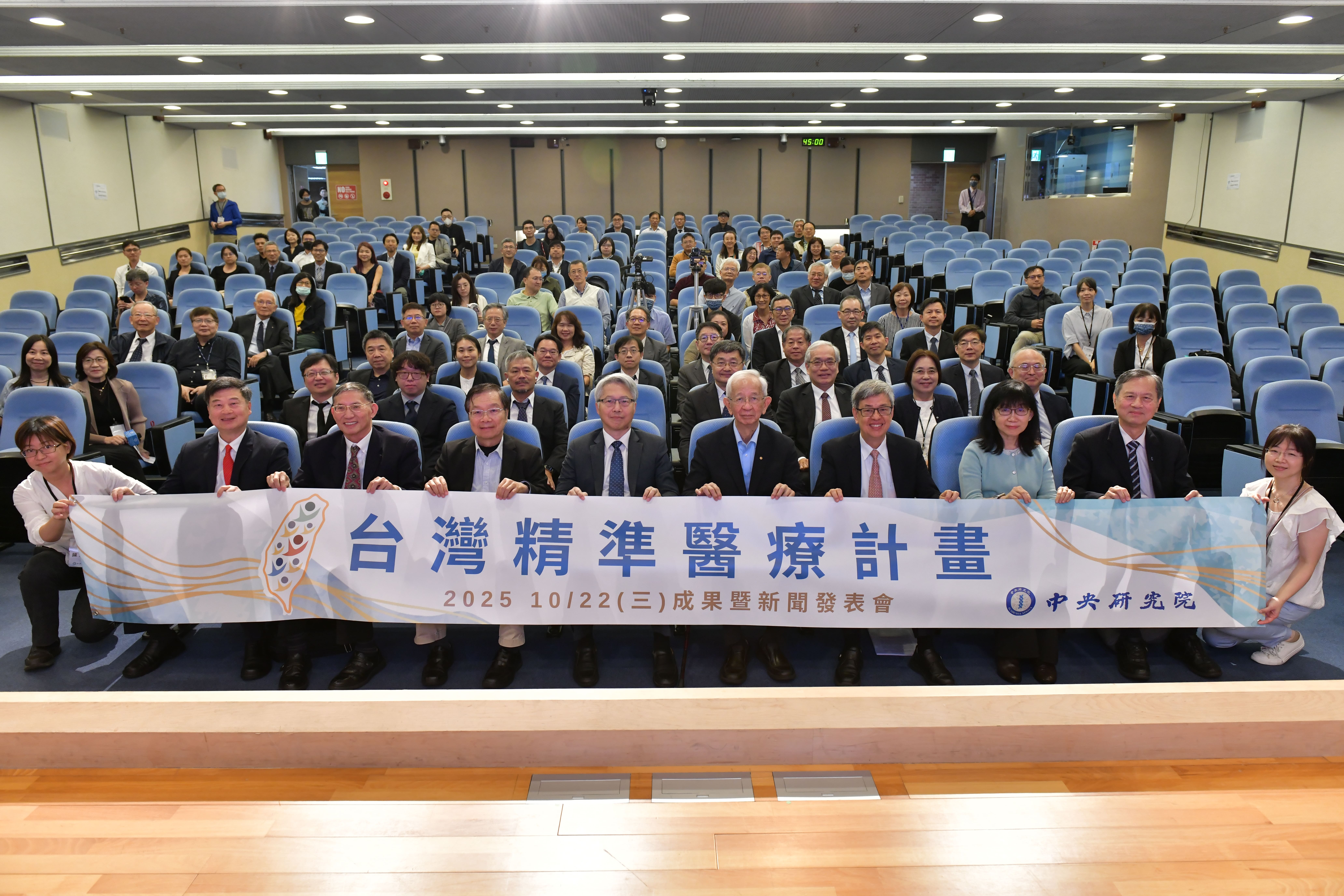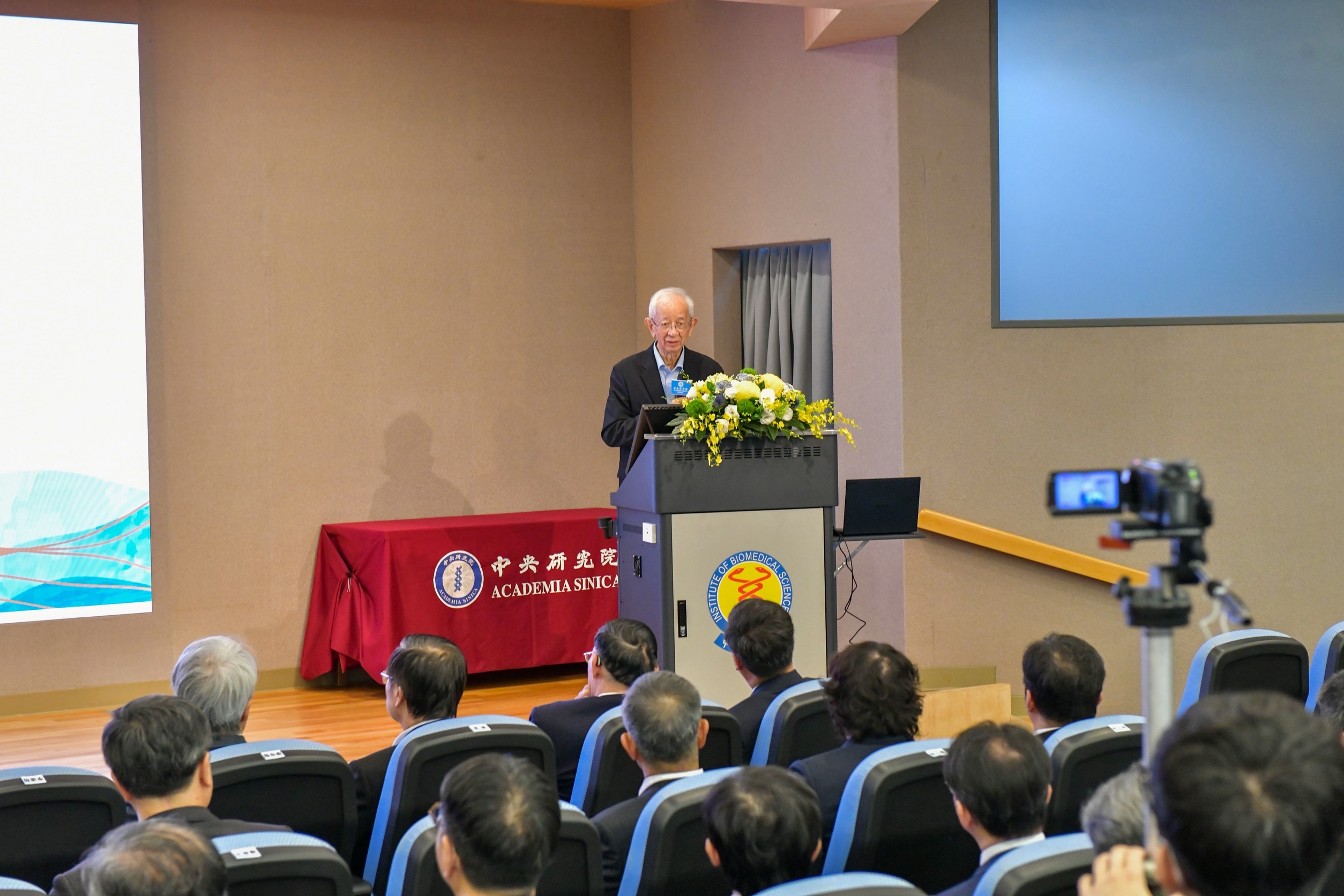Date: 2025-10-22
The Taiwan Precision Medicine Initiative (TPMI), led by Academia Sinica, has established the world’s largest precision medicine research cohort of Han Chinese individuals. By integrating genetic and clinical data, the initiative has developed disease risk prediction methods across multiple conditions, laying a crucial scientific foundation for improving healthcare among more than one billion people of Han Chinese ancestry worldwide.
Academia Sinica President James C. Liao emphasized that “the global foundation of precision medicine has long been based primarily on data from cohorts of European descent. Through TPMI, Taiwan has built a large-scale cohort and database for disease research that reflects the genetic characteristics and their relationship to disease of Han Chinese. This represents not only a major scientific breakthrough but also a milestone in public health.”
Partnered with 16 healthcare systems and 33 hospitals across Taiwan, the TPMI recruited over 500,000 participants to build the world’s most comprehensive genetic and clinical database for the Han Chinese. Using this resource, researchers have developed risk predictors for a wide range of diseases, including autoimmune diseases, cancer, cardiovascular disorders and diabetes.
According to Academician Yuan-Tsong Chen, a TPMI scientific advisor, the team recently published two major papers in Nature. The first paper describes the establishment of the 500,000-person cohort and the systematic collection of medical and genetic data; the second demonstrates how large-scale biomedical data analysis can be used to develop disease risk prediction models. These publications highlight Taiwan’s scientific excellence and contributions that garnered international acclaim and opened a new chapter in disease prevention in Asian populations.
Custom Genotyping Chip Designed for Taiwan’s Population Built the Largest Precision Medicine Database for Han Chinese
The TPMI team developed a customized genotyping array specifically designed for Taiwan’s population to support genome-wide association studies, phenome-wide association studies, and polygenic risk scores. This platform enables exploration of genetic diversity and disease correlations and has been used to develop polygenic risk score models for 105 complex diseases.
The results show that these models achieve significantly higher predictive accuracy in the Han Chinese compared to those developed based on European cohorts, demonstrating TPMI’s scientific and public health impact.
Developed Disease Risk Prediction Models Pushing Towards Early Prevention and Personalized Medicine
TPMI’s findings also revealed strong correlations between genetic variation and multiple diseases, which can be grouped into three major categories:
Cardiometabolic diseases, such as diabetes, hypertension, and obesity;
Autoimmune and infectious diseases, such as hepatitis B, lupus, and psoriasis; and
Renal and metabolic diseases, such as gout and chronic kidney disease.
These discoveries not only help clinicians identify high-risk individuals earlier but also help design preventive strategies across disease categories. TPMI researchers envision integrating genetic information into Taiwan’s national health management system, shifting the healthcare focus from disease treatment to prediction and prevention, thereby reducing the medical cost and social burden of such diseases.
Taiwan Leads Global Han Precision Medicine Research: Setting a New Paradigm for Health Equity
Founding Principal Investigator, Academician Pui-Yan Kwok, emphasized that TPMI marks a significant advance in human genomics and precision medicine. “The TPMI results not only provide more accurate disease risk predictors for Taiwan’s population but also establish a foundation for improving healthcare for the 1.5 billion Han Chinese worldwide—about 20% of the global population,” said Kwok. “Importantly, TPMI offers a replicable model for underrepresented populations, contributing to global health equity in precision medicine.”
Participating Institutions and Acknowledgements
The TPMI is led by Academia Sinica, in collaboration with the following institutions (listed by enrollment):
Taipei Veterans General Hospital; Taichung Veterans General Hospital and its network; Taipei Medical University healthcare system; Kaohsiung Medical University Chung-Ho Memorial Hospital and affiliated hospitals; Chang Gung Memorial Hospital system; National Taiwan University Hospital and its healthcare system; Chung Shan Medical University Hospital; Tri-Service General Hospital; Hualien Tzu Chi Hospital; Far Eastern Memorial Hospital; Changhua Christian Hospital; Fu Jen Catholic University Hospital; Koo Foundation Sun Yat-Sen Cancer Center; Taipei City Hospital system; Chiayi Christian Hospital; and Cathay General Hospital system.
The TPMI team extends its sincere gratitude to all research participants. Funding for this project is primarily provided by Academia Sinica, with additional support from the National Science and Technology Council, partner hospitals, and private philanthropic contributions.
-
Jer-Yuarn Wu, Institute of Biomedical Sciences, Academia Sinica
(02) 2789-9075,jywu@ibms.sinica.edu.tw
-
Ms. Savid Paljilji, Media & Public Affairs, Secretariat, Academia Sinica
(02) 2789-9727,savid@as.edu.tw
-
Ms. Steffi Tung Lin, Media & Public Affairs, Secretariat, Academia Sinica
(02) 2789-8820,tunglin@as.edu.tw
-
 Group photo of Academia Sinica and representatives from 16 healthcare systems. Photo credit: Academia Sinica.
Group photo of Academia Sinica and representatives from 16 healthcare systems. Photo credit: Academia Sinica.
-
 Academia Sinica President James C. Liao and Academician Chien-Jen Chen from the Genomics Research Center posing for a photo. Photo credit: Academia Sinica.
Academia Sinica President James C. Liao and Academician Chien-Jen Chen from the Genomics Research Center posing for a photo. Photo credit: Academia Sinica.
-
 S__125329498
S__125329498
-
 Academician Yuan-Tsong Chen from the Institute of Biomedical Sciences delivering a speech. Photo credit: Academia Sinica.
Academician Yuan-Tsong Chen from the Institute of Biomedical Sciences delivering a speech. Photo credit: Academia Sinica.
-
 Academician Pui-Yan Kwok, Visiting Lecturer at the Institute of Biomedical Sciences, presenting research findings. Photo credit: Academia Sinica.
Academician Pui-Yan Kwok, Visiting Lecturer at the Institute of Biomedical Sciences, presenting research findings. Photo credit: Academia Sinica.
-
 Dr. Hsin-Chou Yang, Director of the Institute of Statistical Science, Academia Sinica, presenting research findings. Photo credit: Academia Sinica.
Dr. Hsin-Chou Yang, Director of the Institute of Statistical Science, Academia Sinica, presenting research findings. Photo credit: Academia Sinica.
-
 Dr. Hung-Hsin Chen, Assistant Research Fellow at the Institute of Biomedical Sciences, Academia Sinica, presenting research findings. Photo credit: Academia Sinica.
Dr. Hung-Hsin Chen, Assistant Research Fellow at the Institute of Biomedical Sciences, Academia Sinica, presenting research findings. Photo credit: Academia Sinica.
-
 Academician Pui-Yan Kwok moderating the media Q&A session. From left to right: Dr. Hung-Hsin Chen, Assistant Research Fellow at the IBS; Dr. Cathy S. J. Fan, Research Fellow at the IBS; Dr. Ming-Shiang Wu, former Superintendent of NTUH; Dr. Wayne Huey-Herng Sheu, Vice President of the NHRI; Dr. Jer-Yuarn Wu, Research Fellow at the IBS; and Dr. Hsin-Chou Yang, Director of the ISS. Photo credit: Academia Sinica.
Academician Pui-Yan Kwok moderating the media Q&A session. From left to right: Dr. Hung-Hsin Chen, Assistant Research Fellow at the IBS; Dr. Cathy S. J. Fan, Research Fellow at the IBS; Dr. Ming-Shiang Wu, former Superintendent of NTUH; Dr. Wayne Huey-Herng Sheu, Vice President of the NHRI; Dr. Jer-Yuarn Wu, Research Fellow at the IBS; and Dr. Hsin-Chou Yang, Director of the ISS. Photo credit: Academia Sinica.









 Home
Home
